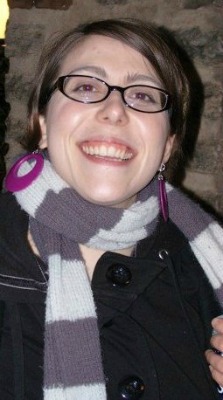
Claudia Cortese
Contest Winner - 3rd Place
Claudia Cortese’s poems have appeared or are forthcoming in Best New Poets 2011, Blackbird, Crazyhorse, DIAGRAM, and Kenyon Review Online, among others. Cortese recently completed her first book of poetry, which explores trauma, myth, fairy tales, and girlhood. She lives and teaches in New Jersey.
The field curdles
in June heat: Lucy plucks her leg hair with tweezers: floats her hairless body through those rotting distances: though Lucy doesn’t see: an unnamed girl: who wants to be all horse: gallops past her, finds a clearing and pulls her skirt over her head: dreams in her dark box of barns on fire: siren-bright: their shrieking holes: and I perch on a sycamore’s highest branch: watch girlhood’s arsons.
“ This is the only poem in my book in which two of the central figures—Lucy and the unnamed girl—cross paths. Lucy, who is an amalgamation of me and my adolescent friends, allowed me to explore the dark side of girlhood—the side that isn’t “cute” or “pretty.” Like Lucy, the unnamed girl is also quite troubled. She is being abused by her father, and she finds healing in nature—among the trees and fields and animals: the nonhuman world that has never hurt her. Though Lucy and the unnamed girl don’t see one another, they are both victims and perpetrators of “girlhood’s arsons,” which is why the colon links them to each other, as well as to the poet: the person who’s recording these arsons. ”
Slippery Banjo
covering the crowd with sheets of sound
that shake the stone street, the papaya stand—
the boy whose jar of coins rust in the rain: pings
that drum through him as water runs down
the windows, the windows like glass
boxes of weeping, and I imagine the music
that honeyed my mother as a girl, sang, Life is a hive
of possibility, then rusted and dried, and though
there are small pleasures in her life—the milk
that froths over the rim of her mug, the pink bark
of the cottonwood’s branches at dusk, her beloved
mutt chasing a chipmunk—a small flame has died
inside her, a candle blown out by the summer rains
that bend the wheat . . . But how can one body
know another—if I stuck my fingers up my mother’s skirt,
knifed her belly and rearranged lung and kidney,
strung her veins like Christmas lights, I wouldn’t
know why her heart beats or ceases, what propels
blood to keep its red march. I see a boy doze
beneath the wide brim of a straw hat, his mud-
caked hands, and think, How sad, I watch stilettos
glitter across the sun-kissed sidewalk, think,
How full of music her life must be. I don’t see
who curls in the night, cries for their mother,
whose life is hollow as a Coca Cola can
in the unused corner of this city’s farthest alley,
its corn syrup and salt slicked away
by the concrete’s heat, its red skin dulled to aluminum,
and I don’t mean to say we’re savages, but perhaps
I am a savage—to imagine I can write
another’s life, to believe I understand this box
of memory and rust, and to describe it to you
as if I know where this body comes from,
where it will return—
“ This poem arrived when I was half asleep, and I grabbed my notebook and pen and jotted it down as fast as I could. Some poems come to me slowly, taking weeks, months—even years—to become whole, but this one was born complete. I wanted to honor the mystery, the magic, of writing this poem, so I didn’t revise it much. I just cleaned up the punctuation and line breaks, and left the rest alone. ”
